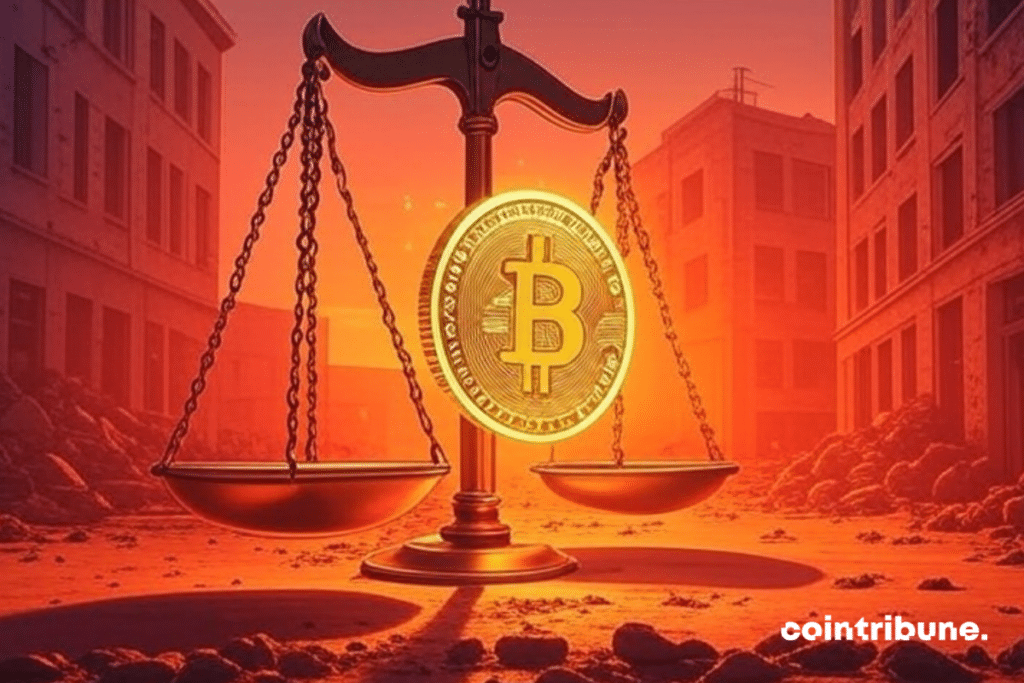16h20 ▪
6
min read ▪ by
Inflation impoverishes billions of people while enriching a few million millionaires. Bitcoin is the antidote.

In Brief
The United States leads with nearly 24 million millionaires in 2024, strengthening its lead thanks to Wall Street and the dollar’s strength.
Inflation worsens inequalities by enriching millionaires through asset appreciation like real estate and stocks, while Bitcoin offers an accessible and revolutionary solution to preserve the capital of non-millionaires.
Millionaire Record
America is the country with the most millionaires (in dollars). There were nearly 24 million in 2024. According to UBS, 7% of Americans are millionaires.
The Swiss bank reports in its annual report 379,000 new millionaires in the United States last year. That is more than a thousand per day. Mainland China ranks second with 6.3 million millionaires and 141,000 more millionaires in 2024.
The United States has strengthened its lead thanks to the rise of Wall Street and the stability of the US dollar. Americans indeed hold 37% of their wealth in the form of financial assets such as stocks (UBS report here):
The first six months of 2025, however, were difficult. The trade war with China and fears of recession weigh heavily on the stock market. Moreover, the dollar has fallen 9% since the beginning of the year.
Worldwide, more than 684,000 people became millionaires. There are 60 million in total, collectively holding 226.47 trillion dollars, over a quarter of the global wealth. UBS notes that this wealth largely comes from real estate appreciation. Property has increased by 30% in the United States over the last ten years.
Conversely, prices in France have only risen by 4%. It’s +21% in Germany. Some European countries, however, stand out. Real estate, for example, has risen by +70% in Ireland, Hungary, and Poland. +140% in Portugal.
All this to say that inflation favors those who own desirable assets. That is, prestigious real estate in big cities, stock shares, art pieces, etc.
And what about Bitcoin?
All bitcoins already in circulation weigh only 2.2 trillion dollars. That is 1% of what millionaires worldwide own. And barely 0.25% of global wealth (900 trillion $).
Needless to say, the potential appreciation of bitcoin is phenomenal. This is what Michael Saylor believes. According to him, global wealth is divided into two equal categories. There are assets that serve to run the economy (450 trillion $) and long-term capital held specifically as a store of value.
Real estate held for appreciation or rental income falls into the second category. As do gold, stocks, artworks, etc.
The rest consists of infrastructure (nuclear plants, airports, etc.), main residences, machines (robotic arms, trucks), etc.
The CEO of Strategy expressed himself in these words in a video addressed to Microsoft shareholders:
Microsoft cannot afford to miss the next technological wave that is bitcoin. It represents the greatest digital transformation of the 21st century. It represents digital capital. Global wealth is distributed between assets that provide utility and those that preserve capital. However, risk destroys thousands of billions of dollars of this capital each year. That is why investors turn to digital capital to avoid this risk. Bitcoin is economically and technically superior to physical capital. It is a revolutionary breakthrough in capital preservation. Bitcoin will eventually be worth several hundred thousand billion dollars.
Michael Saylor
Saylor lists all the risks in his presentation:
In summary, bitcoin will absorb a significant share of the 450 trillion dollars currently allocated to real estate, gold, and other traditional capital.
The Savings Revolution
The problem with the current system is that you already need great wealth to be able to access prestigious real estate ownership. The same goes for artworks and stock shares. No wealth advisor without a very well-funded account.
For ordinary people, there is the Livret A, a popular investment with returns barely above inflation…
Bitcoin is revolutionary in that it is not reserved for those already rich. Each bitcoin is divisible into 100 million “satoshis” (the smallest bitcoin unit). It is possible to buy 10 bitcoins, or 0.001 BTC, or 0.0001 BTC (10 euros).
Bitcoin is the Poor Man’s Mona Lisa. We are in Manhattan in 1700 and the land is for sale! This time, Manhattan is in cyberspace.
Anyone, regardless of the size of their wealth, can acquire it. The rarest and most liquid asset in human history is finally available to all budgets. In other words, bitcoin makes us all equal before inflation.
That is the revolution, not the replacement of banks (the “fiat system”). As Michael Saylor says, states and companies will never do without the credit tool. Just like everyone who wishes to buy a house, which is practically everyone.
Bitcoin is the investment of choice for the eight billion non-millionaires who suffer inflation head-on.
Unfortunately, most think it is too late. Far from it, and that was precisely the purpose of this article. On this note, don’t miss this one: Bitcoin is a much better investment today than ten years ago.
Maximize your Cointribune experience with our “Read to Earn” program! For every article you read, earn points and access exclusive rewards. Sign up now and start earning benefits.
Bitcoin, geopolitical, economic and energy journalist.
DISCLAIMER
The views, thoughts, and opinions expressed in this article belong solely to the author, and should not be taken as investment advice. Do your own research before taking any investment decisions.




